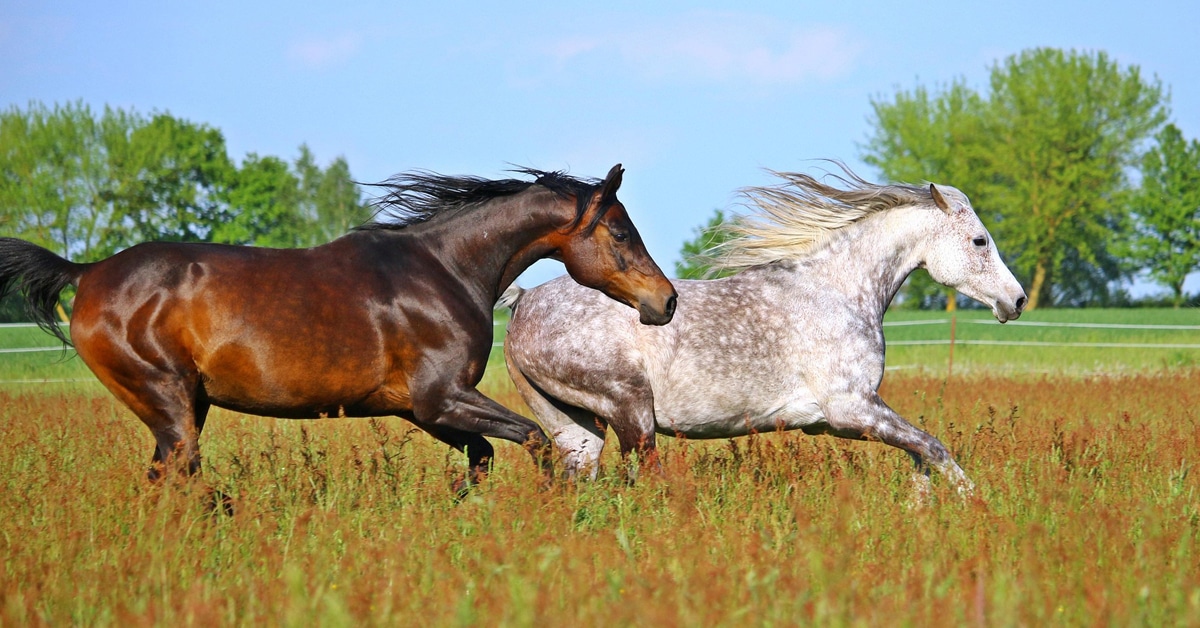Veterinarian Dr. Dennis Rach has long considered dentistry a vital element of horse health care. In practice for nearly 50 years and a partner at Moore Equine Veterinary Centre in Calgary, AB, Rach isn’t only a renowned dentistry expert, he also invented the PowerFloat™ which mechanized floating, making rasping and filing horses’ teeth easier for veterinarians worldwide.
Horse Sport recently asked Rach to list the top 10 dental issues he’s observed over decades of examining equine teeth.
1. Sharp Enamel Points
Rach calls sharp enamel points “the number-one reason for floating teeth.” Horses have developed hypsodont teeth, about 10 centimetres long, that erupt continuously from the gum to compensate for wear from the near-constant action of chewing. The lower jaw is narrower than the upper to facilitate grinding of tough forage into digestible bits as the horse chews in a sideways circular movement.
“As these teeth are erupting and as they wear, things can go wrong,” says Rach. “On a horse’s upper teeth, there are undulations along the sides, just like corrugated metal on the side of a building. The ridge that sticks out is primarily enamel, so as the tooth wears at a few millimetres a year, the chewing surface wears, but the outside enamel ridges tend to persist and get sharp points.”
The points cause cheek cuts and abrasions at the back of the mouth. Points also occur on the inside of the lower teeth against the tongue, but aren’t usually as severe, because the ridges aren’t as high and the tongue can yield more than the cheek.
The Fix: Points usually need to be floated (filed down) once a year – one reason why dental checkups should be scheduled annually or every six months for older horses and those in competition “because the bridle pushes the cheeks in against the sharp points and then you have resistance,” says Rach.
2. Front Upper Hooks
“In a reasonable number of horses [especially those with parrot-mouth] there’s a tendency for the top row of teeth to override the lower row,” says Rach. This “overjet” results in hooks on the upper front cheek teeth. Because the affected tooth is partly unopposed, a section is worn away while the rest of the tooth continues to grow into a sharp protrusion that can dig painfully into the opposite gum and block the action of the chewing cycle.
“Other things start to get worse because of that,” says Rach. “Every time there’s a drop in the jaw, the semi-circular sideways motion of chewing, the little catch point can interfere with movement of the jaw all the way back to the temporomandibular joint (TMJ), which then starts to affect eruption of the teeth and wear.”
The Fix: “If you can remove the hook so everything can slide normally again, then the whole mouth tends to get more normal over time.” While some veterinarians may still use a hand tool called a molar cutter in some situations, most, like Rach, now use mechanized floats. In fact, one reason Rach developed his PowerFloat was because he found molar cutters fractured teeth “like a brick,” often down to the roots. “That’s exactly what happened with one horse. I cracked the tooth down at the root and we had to surgically punch it out of the bottom of the jaw to make an entry point,” he recalls. “That was the day I said ‘I’m never going to do that again.’”
Mechanized floats make quick work of removing hooks and don’t require sedation or anesthesia, as do molar cutters.
3. Rear Lower Hooks (Ramps)
Front hooks usually mean there’s a problem in the rear of the mouth, too. “The mandible [lower jaw] is under-riding, so to speak, at the back, which means the last lower molar might have a hook as well. And that’s the tooth closest to the TMJ. The grinding force is greater there,” says Rach. “Every time the horse chews, the mandible is not going to be able to move forward as it should. It’s restricted back there. That messes up teeth matching up with each other every time the horse chews.”
It’s especially important to correct back hooks in working horses. “When the head goes into a frame, there’s a tendency for the mandible to move forward just a little bit. That lower hook will prevent it from actually moving forward. The horse might feel that little bit of resistance and might fight the rider,” says Rach.
The Fix: Same as for upper front hooks.
4. Excessive Transverse Ridges
Two little enamel bumps on each of the cheek teeth, called transverse ridges, help grind food. Rach describes them as “smooth rooftops on the surface of the tooth.” However, when a horse isn’t chewing properly for some reason, the “ridges get steeper like a roof peak on a house.” These excessive transverse ridges restrict movement of the jaw during the chewing cycle, may cause extra wear on the opposite cheek teeth, and can even force two teeth apart, potentially resulting in gum disease. It can also cause problems when a horse is working in flexion.
The Fix: Smoothing the ridges down to a normal level via floating – which may have to be done over several sessions – “releases the mouth and the friction,” explains Rach.
5. Wave Mouth
When you’re peering at the lower cheek teeth and they appear level except for a “bump” along the surface, the horse has wave mouth, says Rach.
It happens when the cheek teeth erupt in the wrong sequence or baby teeth (caps) are delayed in shedding or retained. Combined with lower teeth that are 30 per cent narrower than the uppers, this leads to what Rach calls “a mortar and pestle phenomenon” where the smaller area grinds into the larger upper area. “So that lower tooth tends to overpower the upper tooth.”
Rach estimates wave mouth occurs in about 60 per cent of horses over the age of four. “The hump on the bottom causes a depression on the top. In those horses that are left alone, by the time they’re 12 or in their mid-teens, the hump on the bottom is over-wearing the top tooth all the way to the gum. Then you can get periodontal disease and premature loss of the upper tooth.”
The Fix: It’s important to begin correction by floating when the horse is young to prevent the situation from worsening as they age and promoting proper grinding of food.
6. Wolf teeth
In most horses, but not all, small wolf teeth erupt between five and 12 months of age. “The wolf tooth used to be a fighting tooth. It’s now a remnant; it’s short and has small roots,” says Rach. Originally the first pre-molar, they’re found on the upper jaw in front of the first cheek tooth.
Often, due to their short roots, they’ll fall out alongside the first cap when it’s shed. Remaining wolf teeth can become an issue for horses wearing bits, however. “Say the horse lunges forward and the bit happens to hit the wolf tooth, it will loosen it a little and the horse will get quite resentful,” said Rach.
The Fix:“When we’re doing dental [exams], we just take the wolf tooth out. Then we know there won’t be a problem.” There is some debate as to whether wolf teeth should be removed as a matter of course. “My answer to that is, I’ve never seen any harm done by taking one out, so take it out,” says Rach.
7. Tooth Loss
Tooth loss is common in older horses as the remaining amount of eruptable tooth diminishes. (By the time a horse is 30, his teeth are worn to just a couple of centimetres in length.) It’s a more serious problem for younger horses.
“Horses are pretty nosy, so they’ll often get booted in the mouth and lose one of their front teeth when they’re younger. Or foals will grab onto something like the edge of a fence and something spooks them and they’ll pull back, knocking out one of their baby teeth,” says Rach. If the underlying developing permanent tooth (bud) is damaged, it may not form properly, or fail to develop at all. It also might erupt at a different rate than the opposing tooth, which will grow into the hole, creating an uneven chewing surface.
The Fix: “Wherever the hole is, the opposing tooth will erupt into it. It’s a minor problem that’s easy to look after if you keep everything level.” He adds that levelling (reduction) should be gradual so the veterinarian doesn’t remove too much tooth material at one time. Beneath the chewing (occlusal) surface are pulp horns which contain nerves, blood vessels and soft tissue, which can become infected if exposed to oral bacteria. For safety purposes, most reductions are limited to 3 or 4 mm. For that reason, cutters should not be used. Carbide or diamond burrs allow a gradual, controlled reduction. After 3 1/2 months a further reduction can be done, because odontoblastic cells at the top of the pulp horns have laid down fresh dentin.
8. Sagittal (slab) fractures
A sagittal fracture is a lengthwise split or slab going up the tooth. Most common in the first and second upper molars, external trauma such as kicks, biting hard objects, and cribbing are usually to blame. Occasionally it’s an emergency situation where the tooth is digging into the side of the cheek, “but lots of times, we’re just doing a routine dental and we’ll see a slab fracture that we have to take care of,” says Rach.
The Fix: The fractured pieces are removed and sharp edges floated. If necessary, the tooth is extracted.
9. Plaque
Horses, especially those fed grain, can develop plaque, a crusty yellowish-brown buildup that’s thickest around the gums, mainly around the canines and the lower front incisors. “During a routine dental we remove the plaque,” says Rach. “If you leave it on, it obviously won’t do the gum margin any good at all.”
If plaque isn’t removed, periodontal (gum) disease can set in, causing bleeding, discomfort, and even tooth loss. Decaying feed packed in between the teeth causes bacteria to proliferate and inflame supportive tissues.
The Fix: Your equine dentist can remove the plaque using scraping tools or a high-pressure stream of prophy powder mixed with antiseptic dental solution. In a few stubborn plaque cases, Rach has also shown owners how to use a soft toothbrush and a germicidal mouthwash every week or two to prevent accumulation.
10. Equine Odontoclastic Tooth Resorption and Hypercementosis (EOTRH)
First identified in 2004, EOTRH is a rather mysterious condition affecting the canine teeth of horses typically 15 years or older. “ It’s something that’s seen more now and we don’t know why,” says Rach. “Odontoclasts are cells like Pac-Man; they eat up tooth material. Odontoblasts lay down material [cementum].” With EOTRH, the odontoclasts are more active than they should be for some reason. He explains, “They start eroding away at the tooth and this causes inflammation in the gum. Then the odontoblasts get stimulated and they make too much cement, so you get these big knobs on the roots of teeth. It’s very painful.”
One of the first signs of EOTRH is a reluctance of the horse to accept treats such as apples and carrots, as well as head-shaking, excessive salivation, bit sensitivity, and weight loss.
The Fix: “We don’t know the cause, and we don’t currently have a treatment that’s effective except to remove the affected teeth,” says Rach.
The Latest










